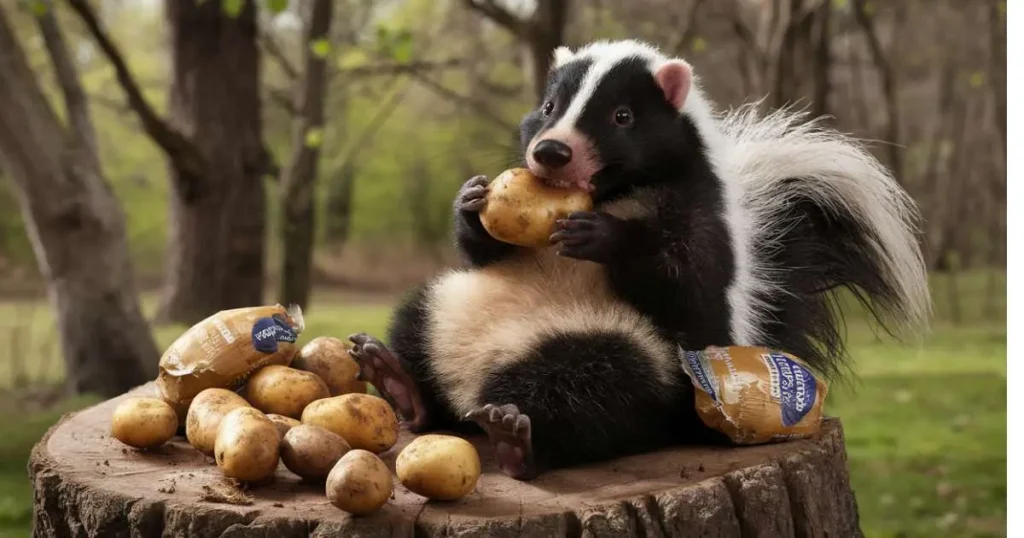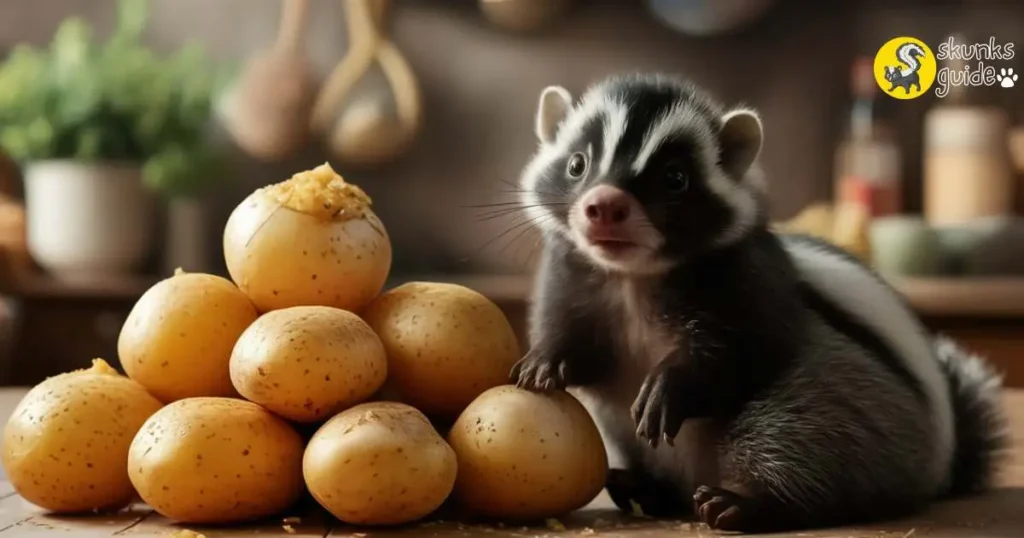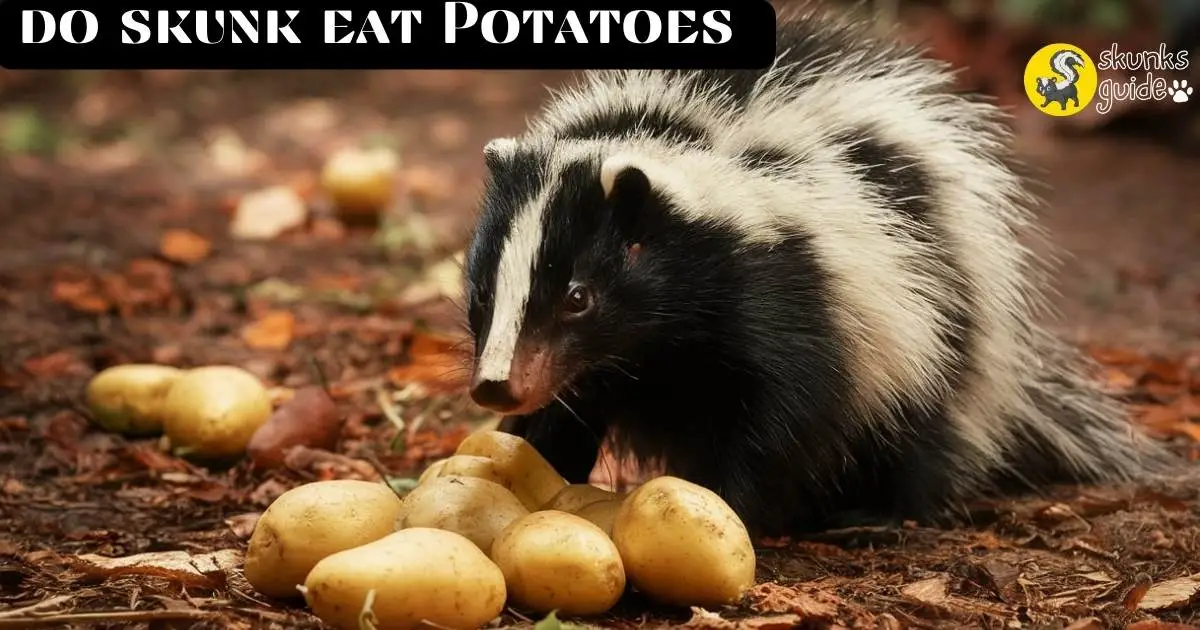Do Skunks Eat Potatoes
Last updated on September 30th, 2024 at 01:37 am
Yes, skunks do eat potatoes! These clever little animals have a wide-ranging diet that includes plants like potatoes. From my experience as a skunk pet owner and wildlife researcher, I’ve seen how skunks will dig into whatever food they can find. Interested in learning how to keep your garden safe from these hungry visitors? Read on to discover more about their eating habits and how to protect your plants.
Potatoes In The Wild: A Skunk’s Interest
Skunks are curious creatures. They often explore their surroundings. This includes searching for food. Potatoes, while not common in the wild, can attract skunks. Understanding their interest in potatoes reveals more about their diet.

Attraction To Root Vegetables
Skunks are omnivores. They eat both plants and animals. Their diet includes:
- Fruits
- Insects
- Small rodents
- Root vegetables
Root vegetables like potatoes can catch their attention. Skunks are drawn to:
- The smell of fresh soil
- The texture of the roots
- The easy access to nutrients
In gardens or farms, skunks may dig for potatoes. They seek food sources that are easy to find and delicious. Potatoes can be a tasty treat for these animals.
Nutritional Value For Skunks
Potatoes offer several benefits for skunks:
| Nutrient | Benefit |
|---|---|
| Carbohydrates | Provide energy |
| Vitamins | Support growth and health |
| Minerals | Help with bodily functions |
Skunks benefit from the nutritional value of potatoes. Eating potatoes can help skunks stay healthy. They gain energy and essential nutrients. This makes potatoes an attractive option in their diet.
Understanding skunks’ interest in potatoes is fascinating. Their natural curiosity leads them to explore different food sources.
Skunks And Human Agriculture
Skunks often wander into farms. They look for food. Potatoes are one of their targets. Understanding their behavior helps farmers protect their crops.
Impact On Potato Crops
Skunks can harm potato crops in various ways:
- Root Damage: Skunks dig to find potatoes.
- Soil Disruption: Their digging disturbs the soil.
- Decreased Yields: Less harvest due to skunk activity.
Farmers may notice signs of skunk activity:
- Holes in the ground.
- Unearthed potatoes.
- Tracks in soft soil.
Protecting crops requires understanding skunk habits.
Adaptations To Cultivated Land
Skunks adapt well to agricultural areas. They find food easily. Their adaptations include:
| Adaptation | Description |
|---|---|
| Diet Flexibility | Skunks eat various foods, including potatoes. |
| Noise Tolerance | They become used to farm sounds. |
| Night Activity | Skunks forage mainly at night. |
Farmers must implement strategies to manage skunks. Simple methods can keep crops safe.
Protecting Your Potatoes From Skunks
Skunks love to dig for food, especially potatoes. Protecting your garden is essential. Use effective methods to keep them away. Here are some strategies to safeguard your precious potatoes.
Effective Deterrents
- Fencing: Build a sturdy fence around your garden. Use materials like wire mesh.
- Motion Sensors: Install lights that activate with movement. Skunks dislike bright lights.
- Strong Scents: Use unpleasant scents to deter skunks. Options include garlic and vinegar.
Safe And Humane Methods
- Traps: Use humane traps to catch and release skunks.
- Natural Repellents: Sprinkle cayenne pepper around your garden.
- Planting: Grow plants that skunks avoid, like lavender or mint.
Protecting your potatoes is crucial. Use these methods to keep skunks away. A little effort can save your garden.
The Truth About Skunks And Potatoes
Many people wonder, do skunks eat potatoes? This question often arises due to the skunk’s reputation as a scavenger. Understanding their diet helps clarify this issue. Let’s explore the facts and myths surrounding skunks and potatoes.
Myths Vs. Facts
Several myths exist about skunks and their eating habits. Here are some common misconceptions:
| Myth | Fact |
|---|---|
| Skunks only eat garbage. | Skunks are omnivores. They eat both plants and animals. |
| Skunks love potatoes. | Potatoes are not a preferred food for skunks. |
| Skunks can digest anything. | Skunks need a balanced diet for health. |
Understanding these myths helps clarify the reality of skunk diets. Skunks will eat various foods, but they have preferences.
Scientific Observations
Research shows that skunks prefer insects, fruits, and nuts. Potatoes are not a common part of their diet. Here are some findings:
- Skunks consume grubs and larvae primarily.
- Fruits like berries attract skunks more than potatoes.
- They forage for nuts and seeds during autumn.
Skunks may nibble on potatoes if they are accessible. This behavior is rare. They do not seek out potatoes as a primary food source.
Understanding skunk eating habits helps in managing gardens and farms. If you grow potatoes, consider these facts. Skunks are not major threats to potato crops.
Wildlife Management And Diet Analysis
Understanding skunk diets helps in effective wildlife management. Skunks are opportunistic feeders. They eat various foods, including fruits, insects, and vegetables. This knowledge assists in predicting their behavior and habitat use.

Research Techniques
Scientists use different methods to study skunk diets. Here are some common techniques:
- Field Observations: Watching skunks in their natural habitats.
- Scat Analysis: Examining skunk droppings to identify food remains.
- Camera Traps: Using cameras to capture skunk feeding behavior.
These techniques offer insights into what skunks eat. They help researchers collect valuable data on their eating habits.
Implications For Conservation
Understanding skunk diets has important implications for conservation efforts. Here are key points:
| Aspect | Implication |
|---|---|
| Habitat Protection | Preserving areas where skunks find food. |
| Food Supply Management | Ensuring a balance of natural foods like potatoes. |
| Human-Wildlife Conflict | Reducing skunk access to gardens and crops. |
Effective wildlife management can protect both skunks and local ecosystems. Understanding their diet helps create better conservation strategies.
Frequently Asked Questions
What Do Skunks Like To Eat The Most?
Skunks primarily enjoy a diet of insects, fruits, and small mammals. They also eat plants, eggs, and carrion. Their favorite treats include berries and grubs. Skunks are opportunistic feeders, adapting their diet based on seasonal availability. This flexibility helps them thrive in various environments.
What Foods Are Poisonous To Skunks?
Foods poisonous to skunks include chocolate, onions, garlic, avocados, and caffeine. These items can cause severe health issues. Avoid feeding skunks any human food that contains these ingredients. Stick to a natural diet for their safety. Always prioritize their health and well-being.
Does Skunk Eat Vegetables?
Yes, skunks eat vegetables. They enjoy a varied diet, including fruits, nuts, and roots. While not their primary food source, skunks will gladly consume garden vegetables when available. Protect your garden if skunks frequent your area.
Conclusion
Skunks may nibble on potatoes, but they prefer other foods. Understanding their eating habits helps gardeners protect their crops. Implementing barriers or deterrents can minimize damage. By being proactive, you can safeguard your garden and keep skunks at bay. Always research to ensure a healthy balance in your outdoor space.

